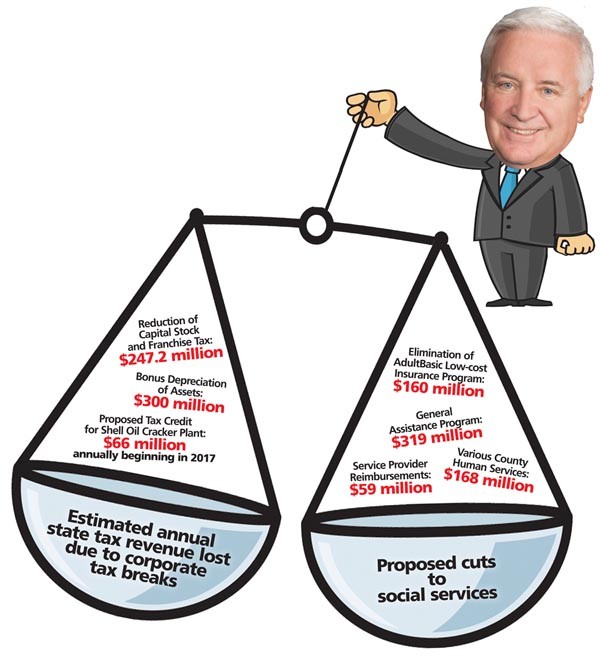As the state races to complete its budget by the end of June, Gov. Tom Corbett has made it clear that he's not afraid to make hard, deep cuts.
His proposed budget, which could change before July 1, makes a 20 percent cut to the state's county human-service agencies, for example, while axing an assistance program which provides limited financial aid to vulnerable Pennsylvanians. Education is slated to make sacrifices too.
But not everyone is hurting.
"The governor has asked a great many Pennsylvanians to take a haircut," says state Rep. Joe Markosek (D-Monroeville), minority chair of the state appropriations committee. "But big business keeps getting a hairdo."
In recent weeks, news leaked out that Corbett wanted to give Shell Oil a tax credit for building a chemical plant in Beaver County. The break, which would be in addition to previously-promised exemptions from most local and state taxes, would cost $66 million annually for 25 years beginning in 2017. The plant could result in about 400 to 1,000 permanent jobs, according to estimates.
"We're chasing 400 jobs with a total $1.7 billion-dollar tax credit," says Sharon Ward, executive director of the Pennsylvania Budget and Policy Center. "That's so fiscally irresponsible that it's mind-boggling.
"They say this will spark other companies to relocate here and bring thousands of jobs. But no one is actually responsible if those jobs aren't realized."
The Corbett administration did not return calls for comment, but when asked June 7 by Philadelphia radio station WHPT about granting tax breaks in the midst of deep cuts to social services and education, Corbett was unapologetic.
"This is all about jobs. You have to separate today's economy from the economy of 2017," Corbett said. "How about a lower unemployment rate? How about a better economy?"
Ward, though, says Corbett's attitude shows a lack of vision. She says that the public-sector job loss in education and social services hurts the economy, and that the cuts hurt working families.
"We lost 14,000 education jobs in this state last year," Ward says. "But this governor insists that the private sector is the only way to create jobs so he's putting all of his focus into that."
The Shell tax credit is just one of several breaks given to big business by the Corbett administration. In January, the state continued a phase-out of the capital stock and foreign franchise tax — a levy on the net worth of any company doing business in Pennsylvania — which cost $247.2 million this year. The rate will drop again in 2013 before being eliminated completely in 2014.
Corbett also adopted a federal policy that allows corporations to completely write off any new equipment purchases made in 2011 and late 2010. Ward's group and state auditors alike estimate that the so-called "bonus depreciation" could cost the state $350 million.
And that's not even counting the fiscal damage done by actions state officials could have taken, but didn't.
Under Corbett, the state has passed fees on the drilling of natural gas that are among the lowest in the country. At current gas prices, the Pennsylvania tax would generate between $244,000 and $350,000 per well. Applying the same calculations, the policy center determined that the tax rate in other states would result in much higher returns, such as $993,700 in West Virginia and $878,500 in Texas.
Pennsylvania also remains the only state to not tax cigars and smokeless tobacco; that results in $50 million of lost tax revenue annually, according to the Harrisburg Patriot-News.
Corbett isn't solely responsible for the situation; the phase-out of the stock and franchise tax began before he took office, and previous governors didn't tax cigars either. But such priorities rankle in a time of austerity.
"When you look at these tax breaks and then you look at the number of people affected by cuts to social services, I think it shows very clearly what the priorities of this administration are," says George Kimes, executive director of the Pennsylvania Community Providers Association, an advocacy group representing 220 human-service providers statewide. "Since the focus here is on jobs, what about the 834 social-service employees laid off just by our member organizations, and that's just a small sampling?"
Still, he adds, "The biggest issue is that thousands of Pennsylvanians won't get the vital services they need."
State Rep. Markosek says he understands the need to entice businesses like Shell to the state.
"I hope [the Shell facility] does help bring future business to the region," Markosek says. "But this proposal to offer tremendous tax breaks to a company that made $30 billion in profits last year comes at a time when we are making horrible, draconian cuts to services that benefit our most vulnerable citizens."
Take the General Assistance Program, set for elimination in the upcoming state budget. The program, which covers small cash payments and health-care benefits for the state's neediest residents, costs about $319 million a year.
Rochelle Jackson, welfare advocate at the South Side-based Just Harvest, says the program is open only to individuals without children who fit in a few narrow categories, like those who are disabled and unable to work, or victims of domestic violence fleeing abuse. Its monthly payment is $205; clients are evaluated for need every six months.
"This program is preventing a great number of people from being homeless," Jackson says. "And once this program is eliminated, they will become homeless.
"We're talking about $205 for all living expense for one month. That may be the amount that politicians and CEOs spend out on a lunch with their colleagues, but for these people it's a lifeline."















